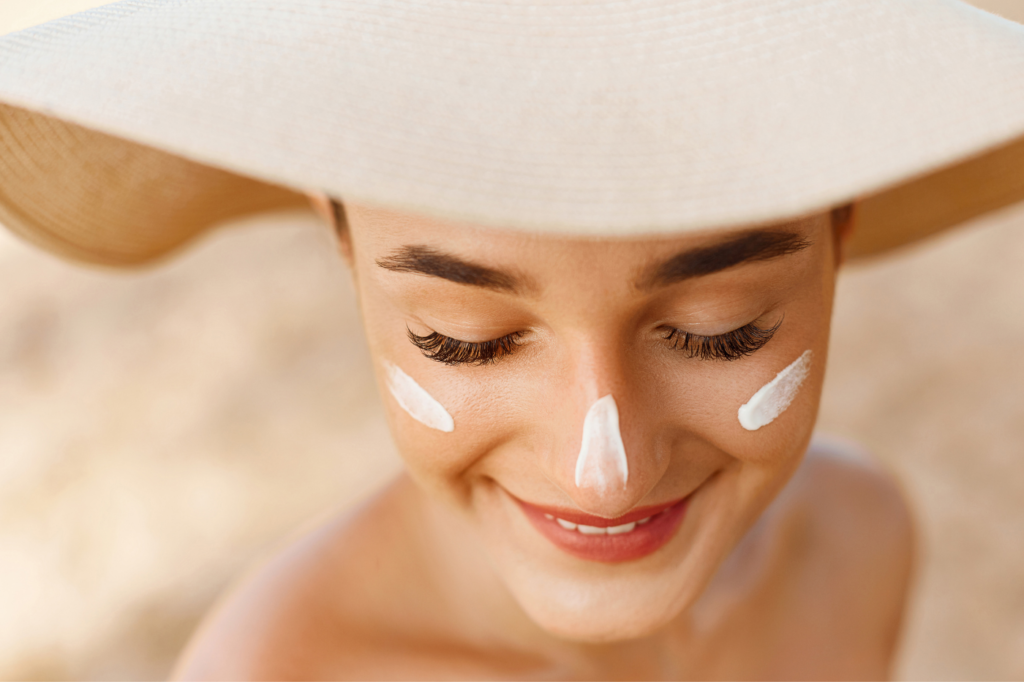There’s no magic pill to protect your skin from sun exposure. But there are sun protection supplements that may offer a measure of protection for your skin when used alongside sunblock and other protective measures.
Recently, some companies have been marketing oral supplements that they say offer skin protection from the sun. Do these sun protection supplements work as well as the manufacturers say they do?
Unfortunately, you can’t simply take a pill to prevent sun damage. You’ll still need to consider sunscreen, high-UPF clothing, and other measures to protect your skin.
But sun protection supplements can play an important role in your daily skincare routine.
What is a sun protection supplement?

A sun protection supplement is a capsule you take to boost antioxidant production in your skin to prevent damage from getting too much sun.
Why is getting too much sun bad for your skin? In addition to the visible light that we see, the sun also gives off UV radiation (ultraviolet radiation), among other types of radiation. When they hit the skin, the sun’s UV rays create free radicals, which, in turn, can cause a lot of damage.
Your skin cells naturally produce antioxidants to fight free radical damage. If you’re exposed to too much UV radiation, the free radicals can overwhelm the natural antioxidant defenses, leading to skin damage like sunburn, skin aging, and even skin cancer like melanoma.
Sun protection supplements work to support and boost your skin cells’ natural antioxidant production. The active ingredients in these dietary supplements travel directly into your cells, where they neutralize free radicals and keep those radicals from doing any damage.
These supplements can also have anti-aging effects because the same free radicals that cause sun damage can also cause photoaging. Protecting your skin from the sun isn’t just good for skin health — it helps keep your skin looking young and beautiful, too.
Do sun protection pills work? Yes, sun protection pills work when used in conjunction with other sun protection measures like sunscreen. The pills help fight oxidative damage and other harmful effects of UV exposure.
What is a sunscreen pill? A sunscreen pill is a supplement that helps protect skin cells from the harmful effects of UV radiation. Sunscreen pills contain high levels of antioxidants, which help mitigate the damage that UV rays do to the skin.
4 Supplements That Provide Sun Protection

Several supplements have been scientifically proven to help protect skin from the harmful effects of the sun. These supplements generally contain either concentrated antioxidants or extracts of plants that have very high antioxidant levels.
Polypodium leucotomos Extract
One of the most effective sun protection supplements is Polypodium extract. It’s made from a species of fern called Polypodium leucotomos, and is available under many brand names, including Heliocare.
Polypodium is full of antioxidants and anti-inflammatory compounds. It’s been shown to reduce the risk of getting a sunburn after UV exposure. These compounds also activate the body’s immune system to help eliminate damaged cells before they turn into cancer.
Some Polypodium extract supplements contain additional antioxidants. For example, Heliocare makes Polypodium supplements that also contain niacinamide, pomegranate, and vitamin C. Niacinamide can also help prevent the formation of skin cancer.
Astaxanthin
Astaxanthin is an antioxidant found in algae, crustaceans, and fish. It’s also thought to have anti-inflammatory and photoprotective effects. Clinical studies have shown that astaxanthin supplements can help counteract the consequences of UV exposure.
CoQ10
Coenzyme Q10 or CoQ10 is another well-known antioxidant. When applied to the skin, CoQ10 can help reduce UV damage to the skin. Studies show that CoQ10 use reduces the activity of antioxidant enzymes in the skin and mitigates the need for DNA repair in skin cells.
Pycnogenol®
Pycnogenol is an antioxidant-rich supplement made with an extract made from the bark of the pine tree Pinus pinaster. It also has photoprotective effects and can even fight against skin hyperpigmentation like melasma.
Pycnogenol can also help fight inflammation and skin cancer development when applied directly to the skin in a lotion. The Pycnogenol lotion was effective after UV exposure, unlike other supplements that need to be taken before going into the sun.
What is the best time to take a sun protection pill? The best time to take a sun protection pill is in the morning, so the ingredients are in your system midday when the sun is the strongest.
Are sun protection supplements safe?
Sun protection supplements are generally safe, depending on what’s in them. For example, randomized, double-blind, placebo-controlled studies have shown that Polypodium leucotomos extract is very safe and has little to no side effects.
If you’re wondering if a particular supplement is safe to use or what dosage you should take, ask your dermatologist. They will tell you if you’re taking the correct dosage and if you need to worry about any toxicity issues.
However, these supplements are not approved by the U.S. Food and Drug Administration (FDA) to protect against UV exposure. They may help mitigate against free radical damage, but you can still get skin cancer if you only take a supplement for sun protection.
Sun protection supplements aren’t a substitute for sunscreen.
The FDA and dermatologists recommend you use sunblock with active ingredients like zinc oxide and titanium dioxide. These offer UV protection by directly blocking UV rays from reaching skin cells.
Other Holistic Sun Protection Habits You Should Have

Sun protection supplements should be used in conjunction with other sun protection measures, such as:
- Topical sunscreen: Broad-spectrum sunscreens (often creams or lotions) block UV rays from reaching the skin. Look for sunscreen formulations with an SPF of at least 30 and offer both UVA and UVB protection.
- Protective clothing: Clothing can also provide protection against UV rays. If you’re going to be in the sun for an extended time, look for clothing with a high UPF, a measure of how well cloth can block UV light.
- Use topical antioxidants: Using skin care products that contain antioxidants can also help undo some of the damage caused by the sun’s rays. (Get help finding the right products for your skin type here.) Look for products that contain vitamin C, CoQ10, or niacinamide.
- Eat antioxidant-rich foods: Eating foods rich in antioxidants like vitamin C and vitamin E can give your body an extra boost of antioxidants to fight free radicals. It’s a way to protect your health from the inside out.
- Eat healthy fats: Healthy fats like omega-3s and monounsaturated fats also protect against the inflammatory effects of sun damage.
The best way to reduce your risk of skin cancer is to use a combination of these habits, including taking a sun protection supplement.
What is the best way to protect yourself from the sun? The best way to protect yourself from the sun is to use a broad-spectrum sunscreen, wear protective clothing, eat an antioxidant-rich diet, and incorporate antioxidant-rich supplements into your daily routine.
Get the Benefits of Sunshine Without the Damage
Keeping your skin healthy doesn’t mean you should totally avoid the sun. Sun exposure is one of our most important sources of vitamin D, which is crucial for everything from immune function to bone health.
Instead, we need to go in the sun safely. The best way to get your vitamin D without damaging your skin is to combine a physical barrier (clothing or sunscreen) with an antioxidant-rich diet that can also include sun protection supplements. You can have your fun in the sun and do it safely.
Sources
- Nestor, M. S., Berman, B., & Swenson, N. (2015). Safety and Efficacy of Oral Polypodium leucotomos Extract in Healthy Adult Subjects. The Journal of Clinical and Aesthetic Dermatology, 8(2), 19–23. Abstract: https://pubmed.ncbi.nlm.nih.gov/25741399/
- Gehring W. (2004). Nicotinic acid/niacinamide and the skin. Journal of Cosmetic Dermatology, 3(2), 88–93. Abstract: https://pubmed.ncbi.nlm.nih.gov/17147561/
- Davinelli, S., Nielsen, M. E., & Scapagnini, G. (2018). Astaxanthin in Skin Health, Repair, and Disease: A Comprehensive Review. Nutrients, 10(4), 522. Abstract: https://pubmed.ncbi.nlm.nih.gov/29690549/
- Ito, N., Seki, S., & Ueda, F. (2018). The Protective Role of Astaxanthin for UV-Induced Skin Deterioration in Healthy People-A Randomized, Double-Blind, Placebo-Controlled Trial. Nutrients, 10(7), 817. Abstract: https://pubmed.ncbi.nlm.nih.gov/29941810/
- Wu, H., Zhong, Z., Lin, S., Qiu, C., Xie, P., Lv, S., Cui, L., & Wu, T. (2020). Coenzyme Q10 Sunscreen Prevents Progression of Ultraviolet-Induced Skin Damage in Mice. BioMed Research International, 2020, 9039843. Abstract: https://pubmed.ncbi.nlm.nih.gov/32923487/
- Grether-Beck, S., Marini, A., Jaenicke, T., & Krutmann, J. (2016). French Maritime Pine Bark Extract (Pycnogenol®) Effects on Human Skin: Clinical and Molecular Evidence. Skin Pharmacology and Physiology, 29(1), 13–17. Abstract: https://pubmed.ncbi.nlm.nih.gov/26492562/
- Sime, S., & Reeve, V. E. (2004). Protection from inflammation, immunosuppression and carcinogenesis induced by UV radiation in mice by topical Pycnogenol. Photochemistry and Photobiology, 79(2), 193–198. Abstract: https://pubmed.ncbi.nlm.nih.gov/15068032/
